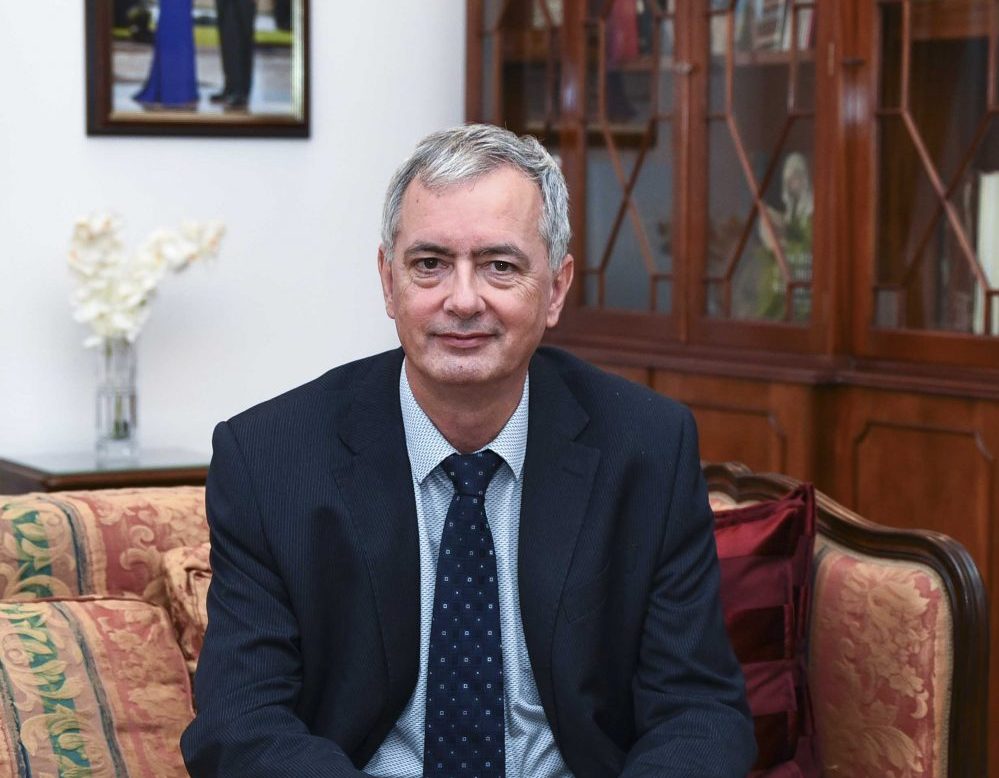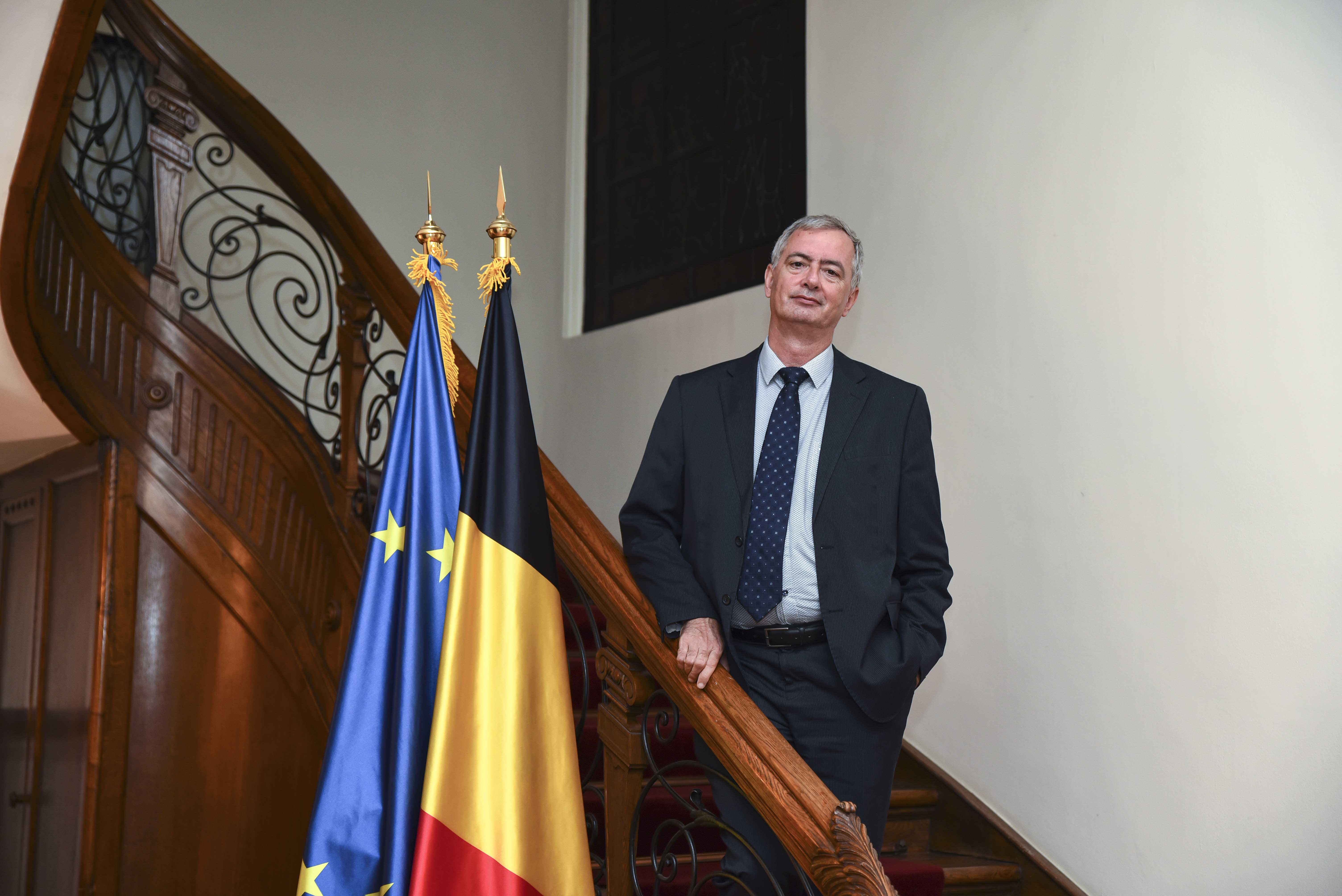The visit of the high level delegation has once again given us the opportunity to reiterate Belgium’s support for Serbia’s European membership perspective

”At the beginning of November a high-level delegation of the Belgian Ministry of Foreign Affairs came to Belgrade for political consultations with the Serbian authorities. We mutually came to the conclusion that our bilateral ties are excellent and that there are no problems whatsoever in our bilateral relations. Our bilateral trade figures are in a constant upward trend, we have established a good partnership on the level of police cooperation and the judiciary, and recently a new resident Defense Attaché has reinforced the Embassy team. Furthermore, Belgian cultural products and performers have found their way to Belgrade on numerous occasions in the past year” says in the interview H.E. Koen Adam, Ambassador of Belgium to Serbia and to Montenegro.
Where do you see a possibility for more robust cooperation between our countries?
— We have taken good note of some of the suggestions made during the bilateral consultations, with regard to cooperation in the field of scientific research and agriculture. These proposals will have to be looked at by our Regional authorities, who have specific competences in these fields. There is always room to step up our bilateral high level contacts, also to boost, promote and give visibility to the European agenda in Serbia. It is clear, however, that we will have to wait for the dust to fall on the post-electoral political situation in Belgium, and the forming of a new government. I also believe that the constitution of a new Belgian-Serbian Parliamentary friend-ship group could pave the way for new exchanges between the two parliaments. Since last year we are going through an extraordinary experience in terms of parliamentary democracy in Belgium, where the search for adequate legislative majorities is obliging parties to collaborate across the traditional parliamentary divide. I am sure our parliamentarians are ready to share their ‘best practices’ in that respect.
How interested are Belgian companies in investing in Serbia, and what can Serbia do to attract more Belgian investment?
— Belgian companies traditionally need some encouragement to explore markets that are not in immediate reach: Even though we are the 11th biggest exporter of goods in the world, 75% of our exports go to neighboring countries, which is logic, also given the specific SME profile of many of our companies. But at the same time it is obvious that more and more companies are attracted to doing business in and with Serbia. This is due to the presence of a well-qualified labor force, but also to a slowly but steadily improving business climate. Serbia has already established a stable macro-economic environment, and is doing serious efforts in the area of infrastructure. There is however still a lot of room for improvement in the area of the rule of law and good governance, also in the economic sphere. Business will thrive in an environment where the judicial branch is trusted to act independently and efficiently, where corruption is effectively tackled, where level playing fields are assured, also in relation to the government policy towards state-owned enterprises. In other words: combined with the good experience of already established Belgian companies, a continuous effort to make Serbia more attractive, through implementation of the necessary reforms, will almost automatically increase the Belgian economic operators’ interest in this market.

As a member of the EU, Belgium actively supports Serbia on its way to joining the EU. How would you rate the results Serbia has made so far in that respect and how do you see the current state of economic and political relations of our two countries?
— The visit of the high-level delegation has once again given us the opportunity to reiterate Belgium’s support for Serbia’s European membership perspective. In October, the former Belgian Prime Minister and First President of the European Council Herman Van Rompuy reconfirmed our commitment in that respect, and encouraged Serbia to continue its reform agenda. There is no need to be distracted or discouraged by the ‘non decision’ taken recent-ly regarding the opening of accession talks with other Balkan countries. Serbia’s macroeconomic figures are excel-lent, also in comparison with some EU member states. We now expect Serbia to show equal determination in pursuing the reform agenda in the area of rule of law, and to create an enabling environment for democratic principles and values to take firm root, with media freedom, a well-performing Parliament and an independent and efficient judiciary.
Do you think that the EU will manage to find a sustainable formula to continue existing as it is, despite Brexit and Euroscepticism both within and beyond the Union?
— I am profoundly convinced that inside the EU we will be able to find a new equilibrium, also after the departure of UK. The EU has time and again proven in the past to be resilient to even the most impacting internal and external shocks. I don’t see why this would be any different today. But to ‘keep our act together’ will require the continued resolve and focus of those who believe in the European project. Brexit, intrinsically a very sad episode indeed, did paradoxically already have a positive effect on the preservation of European unity: all member states agree that we have to protect the European acquis, in the first place its internal market, and look beyond the proper national interests. Similarly, it is obvious that only with European unity, solidarity and cooperation, the big challenges of these times can be tackled, be it in the field of climate change, migration, the fight against terrorism or our position in the world, when talking about trade or the EU foreign and security policy. ‘Unity brings strength’ (L’ Union fait la force’) is written in the Belgian national coat of arms, and I am confident that the new European President, our former Prime Minister Charles Michel, will do his utmost to project this Belgian DNA into the de-liberations at the European Council.
Belgium was traditionally very active in our country in various fields, from education, social inclusion, culture, to ecology and other areas. Could we announce any new activities of the Em-bassy in Serbia?
— Our interest and indeed knowhow in the area of ecology remains vivid: our wind farm companies, for instance, are eager to invest in new fields, once the government releases new quota for renewable energy. We have also companies with specific expertise in wastewater treatment, ready to explore opportunities in the many Serbian cities that still require basic investments in that field. In culture and education we are benefiting from the activities developed by our two, -French and Dutch-, lecturers in the Belgrade University. They are actively promoting our double language-related cultural heritage, including through translations of Belgian authors, and events organized in the framework of the month of the Francophonie. The collaboration between our Royal Library and the university library Svetazor Markovic will culminate next year in a literary exhibition. As in the past Belgium will be present in some of the outstanding cultural festivals in Serbia such as Bitef, Belgrade Dance Festival (with the exquisite contemporary dancer Lies-beth Gruwez), the Jazz Festival, Beldocs… And we are already looking ahead as well to our participation in the Novi Sad Cultural Capital of Europe program. Last month Paul Dujardin, the CEO of Brussels’ famous Bozar-art centre participated in the Creative Europe conference in Belgrade, together with the organizer of the Balkan Trafik festival. That music festival, hosted by Bozar, will – with the support of the Embassy – put the limelight on Serbia in its 2020 edition. It is indeed important to maintain people to people contacts in two directions, an enrichment and in-dispensable human component of our bilateral relations.